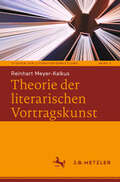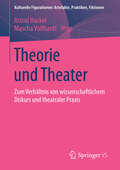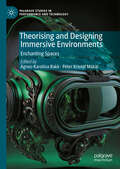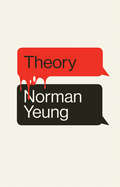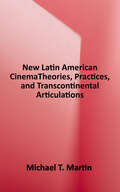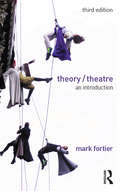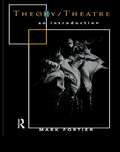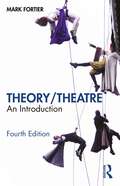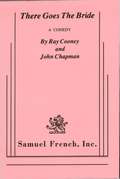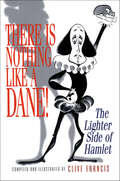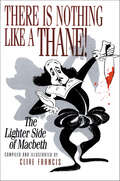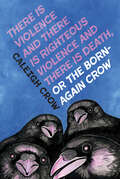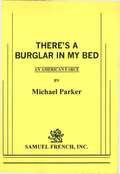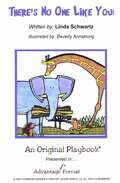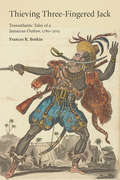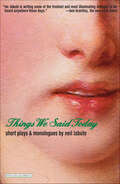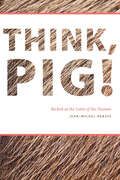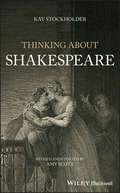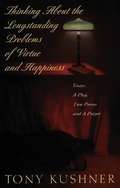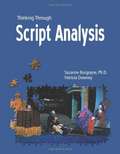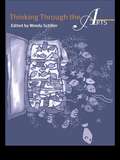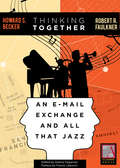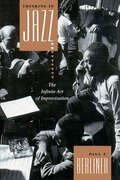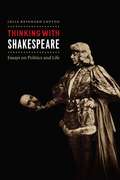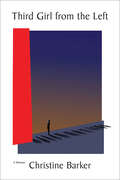- Table View
- List View
Theorie der literarischen Vortragskunst (Studien zur Literaturvermittlung #5)
by Reinhart Meyer-KalkusTheoretische Ansätze zur Analyse literarischer Vortragskunst thematisieren gewöhnlich nur Teilaspekte, aber nicht das Zusammenspiel aller ihrer Faktoren, also von Akteuren, Zuhörern, Räumen, Performances, Vortragsvorlagen und Medientechniken. Auf der Grundlage von Goffmans Performance-Begriff und der amerikanischen Ethnographie des Sprechens entwickelt das vorliegende Buch eine umfassende Konzeption der Vortragskunst als Interaktionsritual und greift dabei auf sprech- und literaturwissenschaftliche Formanalysen zurück, um die Vortragsstimme, ihre unterschiedlichen Sprechgattungen und prosodischen Ausdrucksmittel zu beschreiben.
Theorie und Theater
by Astrid Hackel Mascha VollhardtDie Theaterwissenschaft beruft sich gern auf den gemeinsamen Ursprung von Theorie und Theater. Ein Grund zu fragen, auf welche Weise akademische Diskurse Eingang in zeitgenössische Performances, Tanz- und Theaterinszenierungen finden und was diese umgekehrt zur Vermittlung oder sinnlichen Fremdwerdung theoretischen Wissens beitragen können. Untersucht werden die zahlreichen Verflechtungen und Unwägbarkeiten zwischen Theorie und Theater, die szenische Selbstreferenzialität und Widerständigkeit gegen die eigene Theoretisierbarkeit, die Herausforderungen im Umgang mit humanwissenschaftlichen, (post-)feministischen und queeren Theorien sowie der Stellenwert von Sprache, Sinn und Sinnlichkeit in zeitgenössischen Inszenierungen.
Theorising and Designing Immersive Environments: Enchanting Spaces (Palgrave Studies in Performance and Technology)
by Ágnes-Karolina Bakk Péter Kristóf MakaiThis edited volume discusses the topic of immersion, approaching it from the perspective of various media and stakeholders: experiencers and creators. While the concept of immersion has gained widespread currency in the last decades beyond video games, its critical theory has not reached the same momentum, meaning that there is no unified way of using the term. This causes many misunderstandings and stands as an obstacle to successful expectation management processes, especially in the entertainment industry. This book presents a nuanced platform of discussion to answer the question of how immersion can manifest itself in different media, and how creators are embracing the current trends within the experience economy.
Theory
by Norman YeungIs there a limit to free speech? Who gets to decide? Isabelle’s film theory students are stunned that she would open an unmoderated online discussion group to complement a controversial syllabus. Her intention was for them to learn from each other, but when an anonymous student starts to post racist comments and offensive videos on the forum and others challenge Isabelle’s methods, she is forced to decide whether to intervene or to let the social experiment play out. But the posts soon turn abusive and threatening to Isabelle’s relationship with her wife, Lee, causing her to take matters into her own hands. In this thrilling exploration of the intersections and divisions within liberalism, a young tenure-track professor finds herself in a high-stakes game of cat-and-mouse that has her questioning her beliefs and fighting back for her life.
Theory, Practices, and Transcontinental Articulations (New Latin American Cinema #1)
by Michael T. MartinMapping the historical and cultural contexts of film practices in Latin America, this two-volume collection of programmatic statements, essays and interviews is devoted to the study of a theorized, dynamic and unfinished cinematic movement. Forged by Latin America's post-colonial environment of underdevelopment and dependency, the New Latin American Cinema movement has sought to inscribe itself in Latin America's struggles for cultural and economic autonomy. <p><p> This volume explores the formation of the New Latin American Cinema movement, its national and continental implications (including the diasporic/exilic experience) and transcontinental articulations through the writings of pioneer film-makers and scholars. Glauber Rocha, Julio Garcia Espinosa, Jorge Sanjines, Fernando Solanas and Octavio Getino address the central question of the Latin American aesthetic—a particular style and production method connected with the political and social conditions and circumstances of Latin America. Ana Lopez, Julianne Burton and Michael Chanan examine the movement's formation in the 1950s and its development through the 1980s in a socio-historical context, paying special attention to modes of production and consumption. Paul Willemen assesses the movement's relevance to radical film practice and theory in the First and Third Worlds, and Antonio Skarmeta calls for a distribution network of Third World Cinema on a pan-European level. The volume concludes with essays by Ruby Rich and Zuzana M. Pick who address, from widely different approaches, the issues of the movement's adaptability, renovation and identity, in consideration of its evolution since the 1950s.
Theory/Theatre: An Introduction
by Mark FortierTheory/Theatre: An Introduction provides a unique and engaging introduction to literary theory as it relates to theatre and performance. Mark Fortier lucidly examines current theoretical approaches, from semiotics, poststructuralism, to cultural materialism, postcolonial studies and feminist theory. Drawing upon examples from Shakespeare and Aphra Behn, to Chekhov, Artaud, Cixous and Churchill, the author examines the specific realities of theatre in order to come to a richer understanding of the relations between performance and cultural theory. Theory/Theatre: An Introduction is the only study of its kind and will be invaluable reading for new students and scholars of performance studies.
Theory/Theatre: An Introduction
by Mark FortierTheory/Theatre: An Introduction provides a unique and engaging introduction to literary theory as it relates to theatre and performance. Mark Fortier lucidly examines current theoretical approaches, from semiotics, poststructuralism, to cultural materialism, postcolonial studies and feminist theory. Drawing upon examples from Shakespeare and Aphra Behn, to Chekhov, Artaud, Cixous and Churchill, the author examines the specific realities of theatre in order to come to a richer understanding of the relations between performance and cultural theory. Theory/Theatre: An Introduction is the only study of its kind and will be invaluable reading for new students and scholars of performance studies.
Theory/Theatre: An Introduction
by Mark FortierThis fully updated and revised fourth edition of Theory/Theatre is a unique and highly engaging introduction to cultural theory as it relates to theatre and performance. It is a comprehensive and accessible examination of current theoretical approaches, from semiotics and poststructuralism, through to cultural materialism, postcolonial studies, queer and feminist theories.Key updates to the new edition include further perspectives and expanded content on:- Technology, audience reception and liveness- Further examinations of feminism, transgender and gender theory, as well as queer theory- Disability studies- Critical Race Theory- Decolonization- Intersectionality- Critical PhenomenologyBringing contemporary voices and examples to light, author Mark Fortier introduces the ways in which established and emerging theories can interact with theatre and performance.This is essential reading for undergraduate and postgraduate students of theatre and performance studies.
There Goes The Bride
by John Chapman Ray CooneyComedy / 4m, 4f / Interior / An extremely funny play about a young girl's forthcoming marriage and attitudes about premarital sex. Excerpts from the London reviews and the critics reaction can best describe this farce.
There Is Nothing Like a Dane!: The Lighter Side of Hamlet
by Clive FrancisThere is Nothing Like a Dane is an affectionate compilation of mostly funny (but sometimes serious) bits and pieces about Hamlet - interwoven with Clive Francis's delectable caricatures of various members of the theatrical profession strutting their stuff. The great hall of fame is duly visited, though its inhabitants are not always as dignified as they would like to seem. Here are glimpses in word and pictures of the likes of Donald Wolfit, Kenneth Branagh, John Gielgud, Henry Irving, Jonathan Pryce, John Barrymore, Alec Guinness, Richard Burton and of course, Laurence Olivier. The tone is also elevated now and then by contributions from great writers such as Mark Twain, Charles Dickens, Henry Fielding and P.G. Wodehouse. But the chief delight is in the unexpected: a stubbornly mustachioed Ophelia in Poona, India, an inadvertently horn-rimmed Hamlet on London's Waterloo Road - and would you believe Tony Hancock, Tommy Cooper and even June Whitfield as the Prince of Denmark? This is a book for actors and audiences - and Shakespeare buffs on their day off."A charming bit of fluff for Shakespeare enthusiasts."--Publishers Weekly
There Is Nothing Like a Thane!: The Lighter Side of Macbeth
by Clive FrancisThere is Nothing Like a Thane is a follow-up to Clive Francis's highly successful There is Nothing Like a Dane! The Lighter Side of Hamlet. Thane is a hilarious compilation of unintentional funny moments from a variety of productions of Macbeth - interwoven with Francis's witty caricatures. It also delves into the many superstitions, which have dogged the play since 1603, making it possibly the unluckiest play ever writtenWe hear of how some actors fared better than others when playing the role of the Thane. If Ralph Richardson's was the worst, Peter O'Toole's was certainly the funniest. Olivier was deemed the greatest, John Gielgud the must successful, and Charles Laughton the silliest. We also hear from Orson Welles, David Garrick, Charles Dickens and William McGonagall - who refused to die for fear of upsetting his audience. Not to be outdone we shall hear from a number of Lady Macbeths as well, including Sybil Thorndike, who'd pray every night in the wings so as to ward away evil spirits. This is a book for all those who love the theater, especially the Bard.
There is Violence and There is Righteous Violence and There is Death or, The Born-Again Crow
by Caleigh CrowGrocery-store clerk Beth has had a hell of a week. A hell of a life, actually, full of people squashing her soul. And after pushing back at life—stabbing a steak to her boss’s desk and lighting a magazine rack on fire, for instance—freshly unemployed Beth regroups at her mom’s suburban home. Just when Beth starts to think she’s to blame for systemic limits, the gift of a bird feeder sparks a relationship with a talking Crow who reconnects her with her true power.This sly chamber piece from new voice Caleigh Crow turns post-capitalism ennui on its head with a righteous fury. It unearths the subtle (and not so subtle) ways we gaslight the marginalized, especially Indigenous women, people living with mental-health afflictions, and anyone struggling to make ends meet in low-income service jobs. There Is Violence captures the vivacity and humour of one truly remarkable woman not meant for this earth, and brings her to her own glorious transcendence.
There's A Burglar In My Bed
by Michael ParkerComedy / 3m, 4f / Various sets / William Worthington III and his wife are both going to be away for the weekend from their two hundred acre Massachusetts estate with its twenty six bedroom mansion, he to Delaware to shoot ducks with the Duponts and she to her mother's in Boston. Both have, in fact, arranged trysts with their respective lovers in the estate's beach cottage. Inevitably their paths cross and divorce is in the air. Neither is willing to give up the world famous Worthington necklace, so each devises a plan to steal it. True to the laws of farce, both simulated burglaries are scheduled for same night. Fun filled chaos ensues: mistaken identities, unlikely romantic liaisons, a bumbling private detective, a fake necklace, one very determined nymphomaniac and two scantily clad pseudo nuns sharing a single skirt where did they come from? Confusion is piled on confusion until the mystery of who has the real necklace and who has the fake is revealed in a surprise ending.
There's No One Like You
by Linda Schwartz Beverly ArmstrongWelcome to the world of Playbooks® and the beginning of a wonderful role-play reading adventure! Playbook® stories are presented in a unique and colorful format and are read out loud by several readers like a play, without memorization, props, or a stage. <p><p>When you read a Playbook®, you and other readers bring the story to life and become the characters. As you read your part out loud, you will have fun expressing and acting like your character. You and the other readers will explore the story plot together and learn what will happen next. It's an exciting journey of discovery that pulls you into the story, and you'll want to read it out loud again and again!
Thieving Three-Fingered Jack: Transatlantic Tales of a Jamaican Outlaw, 1780-2015
by Frances R. BotkinThe fugitive slave known as “Three-Fingered Jack” terrorized colonial Jamaica from 1780 until vanquished by Maroons, self-emancipated Afro-Jamaicans bound by treaty to police the island for runaways and rebels. A thief and a killer, Jack was also a freedom fighter who sabotaged the colonial machine until his grisly death at its behest. Narratives about his exploits shed light on the problems of black rebellion and solutions administered by the colonial state, creating an occasion to consider counter-narratives about its methods of divide and conquer. For more than two centuries, writers, performers, and storytellers in England, Jamaica, and the United States have “thieved" Three Fingered Jack's riveting tale, defining black agency through and against representations of his resistance.Frances R. Botkin offers a literary and cultural history that explores the persistence of stories about this black rebel, his contributions to constructions of black masculinity in the Atlantic world, and his legacies in Jamaican and United States popular culture.
Things We Said Today: Short Plays and Monologues
by Neil LaButeThings We Said Today features the scripts for Neil LaBute’s groundbreaking Directv project 10x10—a series of short films written and directed by LaBute based on ten compelling original monologues, five each for men and women. Also included are five short plays displaying the power and scope of Neil LaBute’s creative vision. In Pick One, three white guys come up with a way to solve America’s problems; in The Possible one young woman seduces another’s boyfriend for an unexpected reason. Call Back features an actress and actor who spar about a past encounter that she, unnervingly, remembers much better than he does. Good Luck (In Farsi), “a pleasingly astringent study in competitiveness and vanity” (The New York Times) has two actresses pulling out all the stops in a preaudition psych out; and in Squeeze Play a father and his son’s baseball coach strike a mutually beneficial deal. Rounding out the collection are two monologues commissioned as part of Centerstage’s “My America” project.
Think, Pig!: Beckett at the Limit of the Human
by Jean-Michel RabatéThis book examines Samuel Beckett’s unique lesson in courage in the wake of humanism’s postwar crisis—the courage to go on living even after experiencing life as a series of catastrophes.Rabaté, a former president of the Samuel Beckett Society and a leading scholar of modernism, explores the whole range of Beckett’s plays, novels, and essays. He places Beckett in a vital philosophical conversation that runs from Bataille to Adorno, from Kant and Sade to Badiou. At the same time, he stresses Beckett’s inimitable sense of metaphysical comedy.Foregrounding Beckett’s decision to write in French, Rabaté inscribes him in a continental context marked by a “writing degree zero” while showing the prescience and ethical import of Beckett’s tendency to subvert the “human” through the theme of the animal. Beckett’s “declaration of inhuman rights,” he argues, offers the funniest mode of expression available to us today.
Thinking About Shakespeare
by StockholderExplores the challenges of maintaining bonds, living up to ideals, and fulfilling desire in Shakespeare’s plays In Thinking About Shakespeare, Kay Stockholder reveals the rich inner lives of some of Shakespeare’s most enigmatic characters and the ways in which their emotions and actions shape and are shaped by the social and political world around them. In addressing all genres in the Shakespeare canon, the authors explore the possibility of people being constant to each other in many different kinds of relationships: those of lovers, kings and subjects, friends, and business partners. While some bonds are irrevocably broken, many are reaffirmed. In all cases, the authors offer insight into what drives Shakespeare’s characters to do what they do, what draws them together or pulls them apart, and the extent to which bonds can ever be eternal. Ultimately, the most durable bond may be between the playwright and the audience, whereby the playwright pleases and the audience approves. The book takes an in-depth look at a dozen of The Bard’s best-loved works, including: A Midsummer Night’s Dream; Romeo and Juliet; The Merchant of Venice; Richard II; Henry IV, Part I; Hamlet; Troilus and Cressida; Othello; Macbeth; King Lear; Antony and Cleopatra; and The Tempest. It also provides an epilogue titled: Prospero and Shakespeare. Written in a style accessible for all levels Discusses 12 plays, making it a comprehensive study of Shakespeare’s work Covers every genre of The Bard’s work, giving readers a full sense of Shakespeare’s art/thought over the course of his oeuvre Provides a solid overall sense of each play and the major characters/plot lines in them Providing new and sometimes unconventional and provocative ways to think about characters that have had a long critical heritage, Thinking About Shakespeare is an enlightening read that is perfect for scholars, and ideal for any level of student studying one of history’s greatest storytellers.
Thinking About the Longstanding Problems of Virtue and Happiness
by Tony KushnerThe first collection of writings from the Pulitzer Prize-winning author of Angels in America. Includes Slavs!
Thinking Through Script Analysis
by Suzanne Burgoyne Patricia DowneyBurgoyne and Downey's text in Script Analysis covers all aspects of the traditional course, but in a framework that extends the subject beyond the needs of this course. <P><P>While instructing students in the process of turning a written text into a performance, it uses the broad tool of critical thinking to provide students with tools that they will then be able to use in theater as well as in their studies in other courses -- as well as in their lives. <P><P>Bringing the higher level thinking skills to script analysis enlivens the course while broadening its appeal to students who may well come from outside the theater major. <P><P> The tools brought to bear throughout the book include challenging misconceptions, structuring the thought process, drawing from everyday life examples, carefully building skills one upon another as the student masters them, encouraging students in group work, and providing direction in managing the student's thought and creative processes. <P><P>The book thus uses the scope of script analysis to improve skills in close reading, critical thinking, effective writing, productive group work, and "mental management."
Thinking Through the Arts
by Wendy SchillerThinking Through the Arts draws together a number of different approaches to teaching young children that combine the experience of thinking with the act of expression through art. Developed as an inclusive, broad-ranging and user-friendly text, Thinking Through the Arts presents the unique insight of teachers as researchers, and counters the view that art is emotionally-based and therefore irrelevant to thinking and learning. The areas covered include drama, dance, music, arts environments, technologies, museums and galleries, literacy, cognition, international influences, curriculum development, research and practice. Early childhood and primary teachers and students alike will find this book is an invaluable source of new insights for their own teaching.
Thinking Together: An E-Mail Exchange and All That Jazz
by Howard S. Becker Robert R. Faulkner Larry Gross Arlene Luck Franck Leibovici Dianne HagamanFaulkner and Becker, sociologists and experienced musicians, wrote a book about their musical experiences--Do You Know? The Jazz Repertoire in Action--describing how musicians who didn't know each other could perform competently and interestingly without rehearsing, or playing from written music. When they wrote it, they lived at opposite ends of the country: Faulkner in Massachusetts, Becker in San Francisco. Instead of sitting around talking about their ideas, they wrote e-mails. So every step of their thinking, false steps as well as ideas that worked, existed in written form.When conceptual artist and poet Franck Leibovici asked them to contribute something that showed the "form of life" that supported their work, they collaborated with Dianne Hagaman to put the correspondence in order, which Liebovici exhibited and now appears as an e-book (which allows linking to available performances of the tunes they discussed).It's one of the most revealing records of a scientific collaboration ever made public, and an intimate picture of the creative process.Collective creativity--making sparks of originality produce something more than a glint in someone's eye--intrigues sociologists, people who study communication and theorists of business organization. The collective part of that process, turning an idea into a finished product, is even more complicated, and Thinking Together readers can watch the authors go through all the complications of working together to make the final result happen.Becker played piano in Chicago and Kansas City and taught sociology at Northwestern University. Among his books are Art Worlds and Writing for Social Scientists.Faulkner played trumpet in Los Angeles, got a PhD in sociology from UCLA, then taught at the University of Rochester and the University of Massachusetts (playing professionally in those places too). He is author of two books about the movie business, Hollywood Studio Musicians and Music on Demand: Composers and Careers in the Hollywood Film Industry.
Thinking in Jazz: The Infinite Art of Improvisation (Chicago Studies In Ethnomusicology Ser.)
by Paul F. BerlinerA landmark in jazz studies, Thinking in Jazz reveals as never before how musicians, both individually and collectively, learn to improvise. Chronicling leading musicians from their first encounters with jazz to the development of a unique improvisatory voice, Paul Berliner documents the lifetime of preparation that lies behind the skilled improviser's every idea. The product of more than fifteen years of immersion in the jazz world, Thinking in Jazz combines participant observation with detailed musicological analysis, the author's experience as a jazz trumpeter, interpretations of published material by scholars and performers, and, above all, original data from interviews with more than fifty professional musicians: bassists George Duvivier and Rufus Reid; drummers Max Roach, Ronald Shannon Jackson, and Akira Tana; guitarist Emily Remler; pianists Tommy Flanagan and Barry Harris; saxophonists Lou Donaldson, Lee Konitz, and James Moody; trombonist Curtis Fuller; trumpeters Doc Cheatham, Art Farmer, Wynton Marsalis, and Red Rodney; vocalists Carmen Lundy and Vea Williams; and others. Together, the interviews provide insight into the production of jazz by great artists like Betty Carter, Miles Davis, Dizzy Gillespie, Coleman Hawkins, and Charlie Parker.Thinking in Jazz overflows with musical examples from the 1920s to the present, including original transcriptions (keyed to commercial recordings) of collective improvisations by Miles Davis's and John Coltrane's groups. These transcriptions provide additional insight into the structure and creativity of jazz improvisation and represent a remarkable resource for jazz musicians as well as students and educators. Berliner explores the alternative ways—aural, visual, kinetic, verbal, emotional, theoretical, associative—in which these performers conceptualize their music and describes the delicate interplay of soloist and ensemble in collective improvisation. Berliner's skillful integration of data concerning musical development, the rigorous practice and thought artists devote to jazz outside of performance, and the complexities of composing in the moment leads to a new understanding of jazz improvisation as a language, an aesthetic, and a tradition. This unprecedented journey to the heart of the jazz tradition will fascinate and enlighten musicians, musicologists, and jazz fans alike.
Thinking with Shakespeare: Essays on Politics and Life
by Julia Reinhard LuptonWhat is a person? What company do people keep with animals, plants, and things? Such questions—bearing fundamentally on the shared meaning of politics and life—animate Shakespearean drama, yet their urgency has often been obscured. Julia Reinhard Lupton gently dislodges Shakespeare’s plays from their historical confines to pursue their universal implications. From Petruchio’s animals and Kate’s laundry to Hamlet’s friends and Caliban’s childhood, Lupton restages thinking in Shakespeare as an embodied act of consent, cure, and care. Thinking with Shakespeare encourages readers to ponder matters of shared concern with the playwright by their side. Taking her cue from Hannah Arendt, Lupton reads Shakespeare for fresh insights into everything from housekeeping and animal husbandry to biopower and political theology.
Third Girl from the Left
by Christine Barker&“A beautifully written memoir of life on the Broadway stage at the onset of the 1980s AIDS epidemic . . . Compelling, and remarkably hopeful.&” —Mara Liasson, National Political Correspondent, NPR A moving, real-life account of making it as a dancer in New York City, embracing the changing faces of love and family, and being at ground-zero for one of the most fatal epidemics of modern times . . . Wanting to be a dancer while growing up in a large military family made Christine Barker somewhat of a black sheep, but she followed her dreams to New York City, where—in a moment of almost unbelievable good fortune—she was chosen for the London cast of A Chorus Line. London, and then New York, in the seventies and eighties opened up Christine&’s world. The creativity, culture, and nightlife were intoxicating, enough so to compel her older brother Laughlin to join her. Once there, the divorced father, veteran, and corporate lawyer met rising fashion star Perry Ellis. Romance and success soon followed—as well as rumors of a devastating new disease . . . Broadway&’s theater community is ravaged by loss as the AIDS epidemic takes hold, and Christine is shocked by the toll it&’s taken on her inner circle. Holding on tight to friends and loved ones left behind, the crisis becomes a crucible moment for her family and for all of society. And Christine is once again forced to go her own way to make sense of the tragedy.
